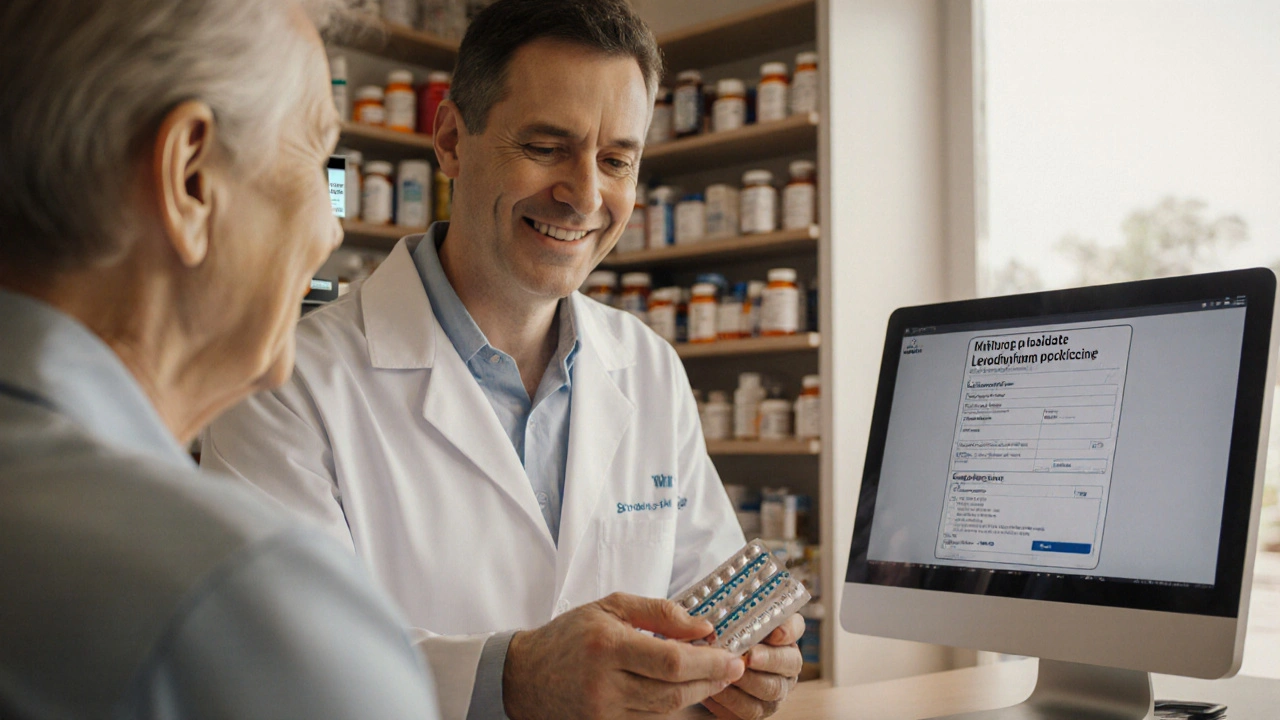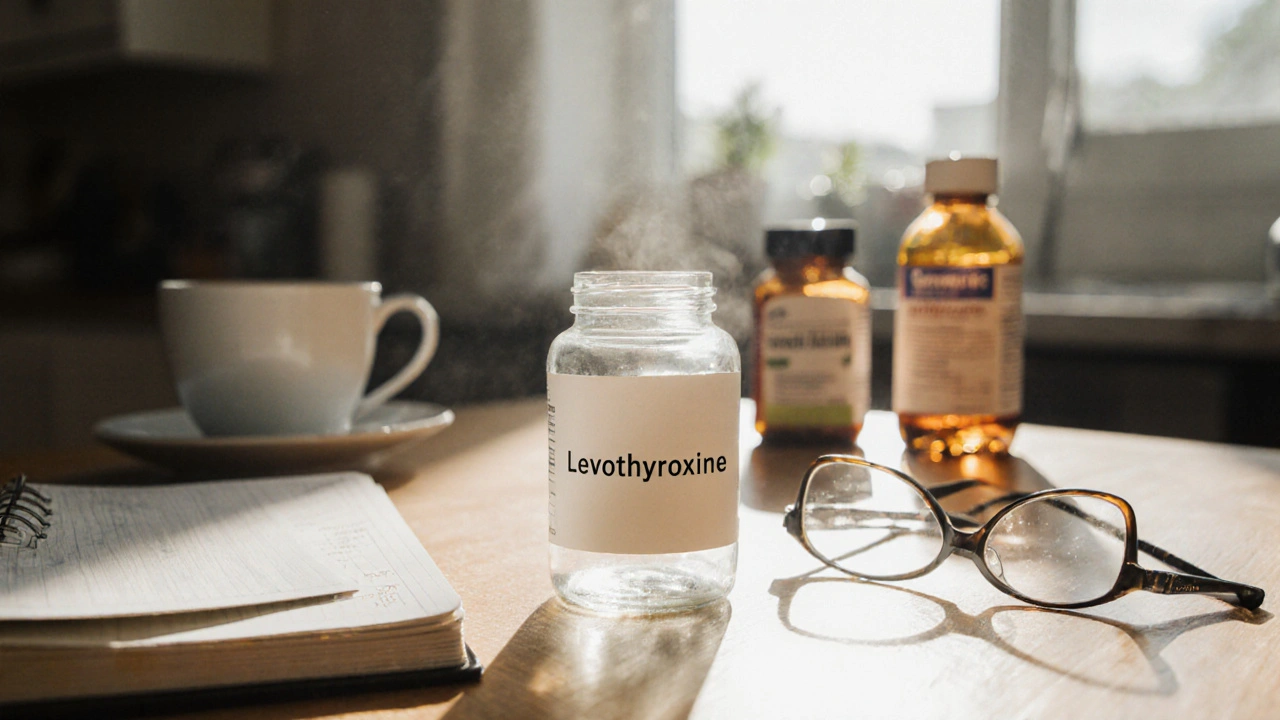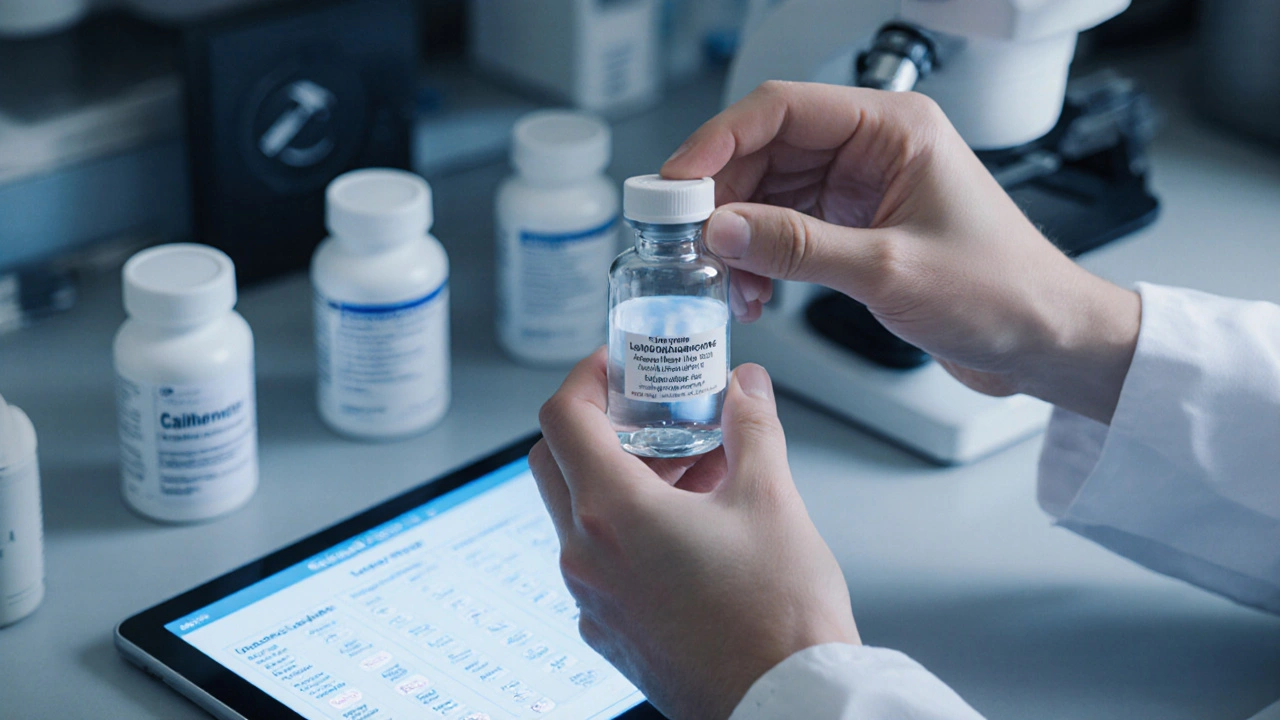 Sep, 26 2025
Sep, 26 2025
Levothroid vs Alternatives Comparison Tool
Medication Options
Compare By
Comparison Table
| Medication | Hormone Type | Formulation | Cost (per month) | Notes |
|---|---|---|---|---|
| Levothroid | T4 | Tablet | $35-$50 | Standard tablet, similar to Synthroid |
| Synthroid | T4 | Tablet | $35-$50 | Brand-name, widely prescribed |
| Levoxyl | T4 | Tablet (different excipients) | $25-$40 | Generic alternative, different coating |
| Tirosint | T4 | Soft-gel capsule / oral solution | $50-$70 | Improved absorption, less food interaction |
| Cytomel | T3 | Tablet | $60-$80 | Fast-acting, short half-life |
| Armour Thyroid | Desiccated thyroid (T4 & T3) | Tablet (natural extract) | $55-$120 | Variable hormone ratios; monitor closely |
TL;DR
- Levothroid alternatives include Synthroid, Levoxyl, Tirosint, Cytomel, ArmourThyroid and desiccated thyroid.
- Synthetic T4 drugs (Levothroid, Synthroid, Levoxyl, Tirosint) are interchangeable in most patients when dosed correctly.
- Liquid and soft‑gel forms (Tirosint) may improve absorption for people with gut issues.
- Combination T3/T4 (Cytomel, Armour) can help patients who still feel fatigued on pure T4.
- Cost varies from free under government schemes to $30‑$80 per month for brand‑name tablets.
When your thyroid is under‑active, the goal is simple: replace the missing hormone and bring metabolism back to normal. Levothroid (levothyroxine sodium) has been a workhorse for decades, but many patients and doctors consider other options. This guide breaks down the most common alternatives, compares key attributes, and helps you decide which formulation might fit your lifestyle and health profile.
Levothroid is a synthetic levothyroxine sodium tablet approved by the FDA for the treatment of hypothyroidism. It supplies the inactive hormone T4, which the body converts into the active T3 form. Levothroid is available in strengths ranging from 25µg to 200µg, comes in a standard tablet, and is marketed by Forest Laboratories since 1999.Why look beyond Levothroid? Some patients experience erratic blood‑test results, persistent fatigue, or gastrointestinal symptoms that may be linked to the drug’s formulation. Others simply want a lower price tag or a version that doesn’t require strict timing around food. Understanding the alternatives helps you and your clinician fine‑tune therapy without trial‑and‑error.
Key Alternatives to Levothroid
Synthroid is a widely prescribed brand of levothyroxine sodium, comparable in dose to Levothroid but manufactured by AbbVie. It offers strengths from 25µg to 300µg and is known for a large market share in the United States. Levoxyl is another FDA‑approved levothyroxine tablet, produced by Mylan. Its tablet coating differs slightly, which can matter for patients with sensitivities to certain excipients. Tirosint is a soft‑gel capsule (or oral solution in some countries) that contains levothyroxine dissolved in a glycerin‑based vehicle. Clinical studies from the American Thyroid Association show improved absorption in patients with celiac disease or lactose intolerance. Cytomel is the brand name for liothyronine sodium, a synthetic version of the active thyroid hormone T3. It is prescribed when patients need a short‑acting T3 boost, often in combination with a T4 drug. ArmourThyroid is a natural desiccated thyroid (NDT) preparation derived from porcine thyroid glands. It contains both T4 and T3 in a roughly 4:1 ratio, mimicking the human hormone mix. Desiccated Thyroid refers generically to powdered animal thyroid extracts, sold under various brand names (e.g., Nature-Throid, WP Thyroid). These formulations also provide a combined T4/T3 blend.All of these options share the same therapeutic target-normalizing thyroid‑stimulating hormone (TSH) levels-but they differ in pharmacokinetics, excipient profile, and dosing flexibility. Below, we unpack the factors you should weigh when evaluating alternatives.
Factors to Compare When Choosing a Thyroid Medication
- Bioavailability: How much of the active hormone actually reaches the bloodstream. Liquid or soft‑gel forms (Tirosint) often have 10‑15% higher absorption compared with standard tablets.
- Dose Flexibility: Ability to fine‑tune dosage in small increments. Levothroid, Synthroid and Levoxyl come in 25µg steps; Tirosint can be measured in drops for even finer adjustments.
- Formulation Sensitivities: Some tablets contain lactose, gluten, or dyes that trigger reactions. Tirosint’s glycerin capsule avoids most common allergens.
- Cost & Insurance Coverage: Brand‑name levothyroxine (Synthroid, Levothroid) often costs $30‑$45 per month, while generic levothyroxine can be <$10 in many national health schemes. NDT products are usually out‑of‑pocket, ranging $50‑$150 per month.
- Clinical Indications: Pure T4 (Levothroid, Synthroid, Levoxyl, Tirosint) works for the majority of patients. Combination T3/T4 (Cytomel, Armour) is considered when symptoms persist despite normal TSH.
- Safety Profile: All levothyroxine products carry the same risk of overtreatment (e.g., heart palpitations, bone loss). NDT carries an additional risk of variable hormone content, requiring closer monitoring.

Side‑by‑Side Comparison Table
| Brand / Generic | Active Ingredient | Formulation | Typical Price (USD/month) | Bioavailability Note |
|---|---|---|---|---|
| Levothroid | Levothyroxine sodium (T4) | Tablet | $30‑$45 (insurance) | Baseline; affected by food & calcium |
| Synthroid | d>Levothyroxine sodium (T4) | Tablet | $35‑$50 (brand) | Similar to Levothroid |
| Levoxyl | Levothyroxine sodium (T4) | Tablet (different excipients) | $25‑$40 (generic) | Comparable to Levothroid |
| Tirosint | Levothyroxine sodium (T4) | Soft‑gel capsule / oral solution | $50‑$70 (brand) | +10‑15% vs tablets, less food interaction |
| Cytomel | Liothyronine sodium (T3) | Tablet | $60‑$80 (brand) | Fast‑acting, short half‑life (≈1day) |
| ArmourThyroid | Desiccated thyroid (mix of T4 & T3) | Tablet (natural extract) | $55‑$120 (out‑of‑pocket) | Variable hormone ratios; monitor closely |
Practical Tips for Switching or Starting a New Thyroid Drug
- Consult your endocrinologist before any change. A 25‑µg dose adjustment can shift TSH by 0.5‑1.0mU/L.
- Schedule blood work 4‑6 weeks after a switch; that’s how long T4 levels stabilize.
- Take the medication on an empty stomach, ideally 30‑60 minutes before breakfast. If using Tirosint, you can take it with water even with meals, but keep the routine consistent.
- Watch for symptoms of under‑ or overtreatment: fatigue, weight change, heart palpitations, or cold intolerance.
- Record any side effects in a journal - especially if you try a combination product like Cytomel or Armour.
Many patients report that a tiny formulation tweak-switching from a tablet to a soft‑gel capsule-makes a noticeable difference in energy levels. That’s often because the gut absorbs the hormone more predictably, reducing the need for strict timing.
Related Concepts Worth Exploring
Understanding thyroid medication fits into a broader health picture. Here are four topics that naturally follow:
- Thyroid Function Tests: TSH, free T4, and free T3 labs guide dosing decisions.
- Dietary Interactions: Calcium, iron, soy and high‑fiber foods can blunt levothyroxine absorption.
- Pregnancy Management: Hormone needs often increase by 30‑50% during the first trimester.
- Autoimmune Thyroiditis (Hashimoto’s): The most common cause of hypothyroidism; influences choice of natural vs synthetic therapy.
Each of these areas helps you have a more informed conversation with your clinician and tailor therapy to your lifestyle.
Next Steps for Readers
- Gather your recent thyroid lab results and bring them to the next appointment.
- Ask your pharmacist about generic levothyroxine options and any available discount programs.
- If you suspect a formulation sensitivity, request a trial of Tirosint or a liquid levothyroxine preparation.
- Consider a brief trial of a low‑dose T3 (Cytomel) if you still feel sluggish on optimal T4 doses.
Remember, the “best” medication is the one that keeps your TSH in range, feels right in daily life, and fits your budget. Use the comparison table as a cheat‑sheet, but let your doctor tailor the final prescription to your unique profile.

Frequently Asked Questions
Can I switch from Levothroid to Synthroid without a doctor’s order?
No. Even though the active ingredient is the same, the dosage and tablet coating differ slightly. A doctor should approve the switch and schedule follow‑up labs to confirm that TSH stays stable.
Why do some people feel better on Tirosint than on regular tablets?
Tirosint’s soft‑gel or liquid form bypasses certain gut‑based absorption hurdles. If you have a condition like celiac disease, lactose intolerance, or are on proton‑pump inhibitors, the hormone may reach your bloodstream more consistently, leading to steadier TSH levels.
Is desiccated thyroid safer than synthetic levothyroxine?
Safety is comparable, but desiccated thyroid contains a fixed T4‑to‑T3 ratio that varies between batches. This can cause swings in hormone levels, so it requires more frequent monitoring. Synthetic levothyroxine offers a more predictable dose.
Do I need to take my thyroid pill at the same time every day?
Yes. Consistency helps maintain stable blood levels. If you switch to Tirosint, you have a bit more flexibility, but keeping a regular schedule still gives the most reliable results.
Can I take calcium or iron supplements with Levothroid?
Not together. Calcium or iron can cut levothyroxine absorption by up to 40%. Separate them by at least four hours-take your thyroid medication first, then wait before the supplement.

Suzanne Podany
September 26, 2025 AT 19:12Thanks for putting together this thorough comparison; it really helps people see the options side by side. I appreciate the clear layout of costs and formulations. If anyone is struggling with absorption issues, the Tirosint soft‑gel note is especially useful. Remember to discuss any switch with your doctor to keep labs on track.
Nina Vera
September 26, 2025 AT 20:06Wow, this chart is like a fireworks display of thyroid meds! 🎆 (just kidding, no emojis) The way you laid out the pros and cons makes me want to try every single one. My stomach hates pills, so the liquid Tirosint looks like a miracle. Keep the updates coming, this is gold for people like me!
Sunil Kamle
September 26, 2025 AT 22:53Allow me to express, with the utmost formal decorum, my admiration for the diligent compilation of data presented herein. One must, however, consider the subtle nuances that extend beyond mere tables. The pharmacokinetic profile of levothyroxine formulations varies not only with excipients but also with patient-specific gastrointestinal dynamics. While the author rightly highlights Tirosint's improved absorption, it is equally critical to recognize that such superiority may be marginal in the absence of malabsorption syndromes. Moreover, the cost differentials, though noted, ignore insurance formularies that dramatically alter out‑of‑pocket expenses. It would be remiss not to mention that the T3‑containing agents, Cytomel and Armour, possess distinct half‑lives necessitating careful titration to avoid iatrogenic thyrotoxicosis. The clinical relevance of a 10‑15% absorption boost is questionable when adherence is suboptimal. In addition, the blurring between brand‑name and generic Levothyroxine can lead to unnecessary brand loyalty, fostering higher costs without therapeutic gain. One might also reflect on the psychological impact of switching brands; some patients report perceived symptom changes despite identical serum levels. This underscores the placebo‑nocebo phenomenon, a factor the article glosses over. The recommendation to wait four to six weeks after a switch is sound, yet the underlying rationale-stabilization of TSH and peripheral conversion-could be elaborated for lay readers. Finally, the brief mention of desiccated thyroid omits discussion of batch‑to‑batch variability, an issue of paramount importance for safety monitoring. In sum, the guide is useful, but a deeper dive into these ancillary considerations would elevate it from a handy reference to a comprehensive resource.
Michael Weber
September 27, 2025 AT 00:16In the grand theatre of endocrine therapy, one must contemplate the metaphysical interplay between hormone and identity. The author's exposition, while factually sound, skims the abyss of patient experience. Consider that each tablet is not merely a chemical vector but a symbol of agency over one’s metabolism. If the form of delivery alters perception, the therapeutic outcome may shift in subtle, unquantifiable ways. Thus, the discussion of soft‑gel versus tablet transcends pharmacology; it encroaches upon existential autonomy.
Blake Marshall
September 27, 2025 AT 01:40The table is solid, but ya gotta check the fine print on the generic levothyroxine. It’s definatly cheaper and works just as good if you stick to the same brand each time.
Daniel Buchanan
September 27, 2025 AT 02:13Good point about the generics. Consistency is key; switching between manufacturers can cause tiny dose variations that mess with TSH. If you find a generic you trust, stay with it and monitor levels regularly.
Lena Williams
September 27, 2025 AT 04:26I've been testing different brands for years, and honestly, the pill coating can be a deal‑breaker. Some people swear by the coating-free options because they have stomach sensitivities. That's why the mention of lactose‑free tablets is such a relief for those of us who can't handle dairy. Also, the soft‑gel capsules seem to bypass a lot of that gut drama, which is why many of my friends with celiac disease report better control. Bottom line: don't just pick the cheapest-look at your own digestive quirks. And keep a symptom diary; you'll spot patterns quicker than a lab test can show.
Sierra Bagstad
September 27, 2025 AT 05:50The comparison correctly emphasizes the importance of consistent timing. Even a 30‑minute deviation can affect absorption, especially with calcium or iron intake. Patients should schedule their thyroid dose at least four hours apart from such supplements. Regular monitoring remains the cornerstone of successful therapy.
Alan Kogosowski
September 27, 2025 AT 08:36When dissecting the landscape of levothyroxine alternatives, one must adopt a systematic, multi‑dimensional approach. First, the pharmacokinetic profile of each formulation governs its suitability for patients with variable gastrointestinal absorption. Second, the excipient matrix-be it lactose, gluten, or dyes-can precipitate adverse reactions in susceptible individuals. Third, the economic considerations, including insurance coverage and out‑of‑pocket costs, often dictate real‑world adherence. Fourth, the clinical context-such as pregnancy, cardiac comorbidities, or concurrent autoimmune disease-necessitates tailored dosing strategies. Fifth, the psychosocial element, wherein patient preference for pill versus liquid or capsule forms influences compliance, cannot be overstated. Sixth, the interplay between T4‑only versus T4/T3 combinations demands careful assessment of residual symptoms despite euthyroid TSH. Seventh, the longitudinal data on desiccated thyroid highlight batch‑to‑batch variability, raising concerns about dose stability. Eighth, the emerging evidence on soft‑gel Tirosint suggests a modest but reproducible increase in serum free T4 levels compared with traditional tablets, particularly in patients on proton‑pump inhibitors. Ninth, the necessity of periodic thyroid function tests-ideally 4‑6 weeks after any alteration-remains a non‑negotiable pillar of management. Tenth, the importance of patient education regarding dietary interactions, such as calcium, iron, soy, and high‑fiber meals, is paramount to maintaining therapeutic efficacy. Eleventh, clinicians should remain vigilant for signs of overtreatment, including atrial fibrillation and bone demineralization, especially when higher‐dose T3 formulations are employed. Twelfth, the selection of a brand may be influenced by formulary restrictions, making generic levothyroxine the default choice for many health systems. Thirteenth, the potential for drug–drug interactions, for instance with certain antidepressants or antihyperlipidemic agents, warrants a thorough medication reconciliation at each visit. Fourteenth, patient-reported outcome measures, such as the ThyPRO questionnaire, can supplement laboratory data to gauge quality of life improvements. Finally, an individualized, evidence‑based regimen-iteratively refined through shared decision‑making-optimizes both biochemical targets and patient satisfaction.
Ben Lee
September 27, 2025 AT 10:00Excellent breakdown, Alan. I’d add that regular follow‑up labs are the safety net for all these variables you listed. Also, a simple symptom journal can catch issues before they flare. Collaboration between patient and clinician really makes the difference. Thanks for the comprehensive overview.
Terry Washington
September 27, 2025 AT 11:23Your simplistic overview betrays a profound ignorance of endocrine physiology.
Claire Smith
September 27, 2025 AT 12:46While the guide is informative, it neglects to address the variability in insurance formularies that can dramatically affect patient access. Moreover, the brief mention of desiccated thyroid fails to contextualize its batch variability. A more rigorous analysis of cost‑benefit would enhance its utility.
Ellie Haynal
September 27, 2025 AT 15:33We cannot let such oversights slide; patients deserve transparent cost information. It is irresponsible to gloss over insurance nuances when medication adherence hinges on affordability. Furthermore, the omission of batch variability in natural extracts is a glaring gap. Let’s demand a revision that includes these critical details. Together, we can push for clearer, patient‑centered guidance.